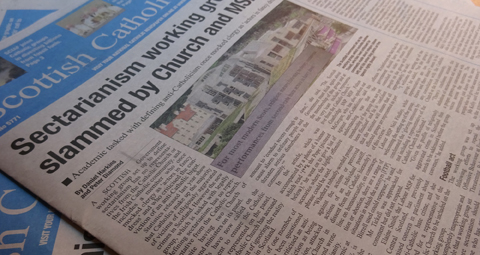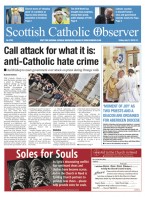June 8 | ![]() 0 COMMENTS
0 COMMENTS ![]() print
print

Anti-Catholicism and anti-Irish racism will not be excluded from government sectarianism review, chair says
Professor Duncan Morrow responds to the SCO’s revelations that a working group to define sectarianism had no representatives from the Catholic Church and included a member that once mocked clergy as ‘actors in fancy dress’
On April 27 the SCO revealed a government working group set up to define sectarianism in Scotland had no representatives from the Catholic Church or the Irish Catholic community and included a member, Andrew Tickell, who once mocked clergy as ‘actors in fancy dress’ and who criticised the conviction of an anti-Catholic bigot on free speech grounds. The working group was subsequently heavily criticised by the Church and MSPs from different political parties.
Below, Professor Duncan Morrow, of Ulster University, the chair of the working group, responds.
“Your article raised a number of important questions and deserves a considered response.
For purposes of clarity, the working group to which the article referred was established to address the specific recommendation from the Scottish Parliament’s Justice Committee that consideration be given to the of introducing a definition of ‘sectarianism’ in Scots Law. Although the recommendation was made as the result of the committee’s considerations of the Offensive Behaviour at Football and Threatening Communications (Repeal) (Scotland) Bill, the working group has no direct relationship to the debate on the Bill or the 2012 Act which the Bill ultimately repealed.
The terms of the reference of the working group are focused, time-limited and restricted and we hope to complete our work before the end of the summer. I understand that the Scottish Government is committed to an open consultation on the findings of the working group before making any commitments to further action. Therefore we hope that with an interest will actively participate in this process prior to any decisions being taken on the adoption of a legal definition.
The membership of the group was established by the Scottish Government to reflect the task: experience on advising on community approaches to addressing sectarianism and specific legal expertise in regard to the options and obstacles applying to possible approaches. As the group has no representative function, and in order to protect our independence, the invitation to participate was personal and those invited to participate were invited on as individuals and not to represent any organisation they may be affiliated to.
Your report raised specific concerns about one of our members, Dr Andrew Tickell, especially in relation to a published article written in 2011 in which he ‘criticised the conviction of an anti-Catholic bigot.’ Dr Tickell is a highly-regarded lecturer in law who has made important contributions to the working group in relation to questions on the operation of the law, and specifically how we can ensure that a legal definition could be practically applied to support prosecutions in Scots Law. Having reviewed his writing in the light of your article, I am satisfied that his concern in 2011 was about the restriction of free speech and should not be interpreted as a defence of sectarianism or bigotry. It was intended as an attempt to challenge the extent to which law should infringe on freedom of expression which, I am sure you will agree, is an important aspect of our current task.
I am of course concerned about any implication, impression or allegation that our work is either explicitly or implicitly directed to exclude or prevent concerns about anti-Catholicism or anti-Irish racism in Scotland being raised or properly addressed. I can assure that this is absolutely not the case and that I and the group recognise that it is of paramount importance to ensure such issues are fully considered as part of our work.
Before we complete our limited task, I hope to meet directly with all political parties in parliament both to hear any concerns and, as far as possible to, ensure that progress towards ending the reality and consequences of sectarianism in Scotland is not seen as partisan or exclusive. I would also welcome an opportunity to meet with representatives of the Church to discuss our work, and the process for establishing a definition, in more detail. Finally, I would like to underline that our work will be open to scrutiny, is non-binding in nature and will only progress if it is seen to make a real contribution to the quality of life in Scotland and to build and protect the rights and relationships of all. The interest of many stakeholders in our work is gratifying, underlying the importance attached by many to addressing this issue properly. On a personal level, I very much hope that we can develop an open and constructive cooperation around this issue and that the outworkings of the group will create an important opportunity for everyone, including all those in the Catholic and Irish communities in Scotland, to shape.
– Duncan Morrow chairs the Working Group exploring the potential for a legal definition of sectarianism in Scotland.











